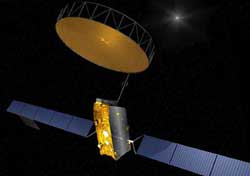Successfully launched the most complex satellite information
At 2045 ( November 8, Hanoi time ), Inmarsat-4 F2, one of the largest and most powerful communications satellites, was successfully launched by the Zenit-3SL missile into orbit from the Pacific.

Inmarsat satellite 4
Inmarsat-4 F2 is the second of three satellites designed to improve global information systems. The first satellite, active in most of Europe, Africa, the Middle East, Asia and the Indian Ocean, was launched from Cape Canaveral in March 2005. The second, British-built satellite will improve and expand information throughout South America, North America, the Atlantic and part of the Pacific.
These two identical satellites, about the size of a London bus, will operate for about 15 years. They are designed and manufactured by EADS Astrium, Europe's leading satellite manufacturer. Weighing nearly 6 tons, Inmarsat satellites are equipped with electric propulsion systems. 45 m wide solar panels produce 14kW of electricity. The main body of the satellite is 7m high.
Two satellites will support Inmarsat's global broadband network based in London. Technology on each satellite allows people to set up virtual offices anywhere in the world through high-speed broadband connections and third-generation phone technology (3G). Beneficiaries are commuter traders, rescue workers and journalists.
Minh Son ( According to BBC, Reuters )
- China has successfully launched the information satellite
- Successfully launched information satellites 'SinoSat-3'
- The US has just launched the first 3G information service satellite
- Successfully launched Measat-3b satellite from Malaysia
- India and Venezuela launched satellites into orbit
- Japan launched the fourth radar satellite
- Russia successfully launched a military satellite
- China launched a satellite for Pakistan
- China successfully launched a new map satellite
- China successfully launched the North Dau satellite
- Successfully launched the AsiaSat 6 satellite rocket into orbit
- America launched a new military satellite
 Van Allen's belt and evidence that the Apollo 11 mission to the Moon was myth
Van Allen's belt and evidence that the Apollo 11 mission to the Moon was myth The levels of civilization in the universe (Kardashev scale)
The levels of civilization in the universe (Kardashev scale) Today Mars, the sun and the Earth are aligned
Today Mars, the sun and the Earth are aligned The Amazon owner announced a secret plan to build a space base for thousands of people
The Amazon owner announced a secret plan to build a space base for thousands of people